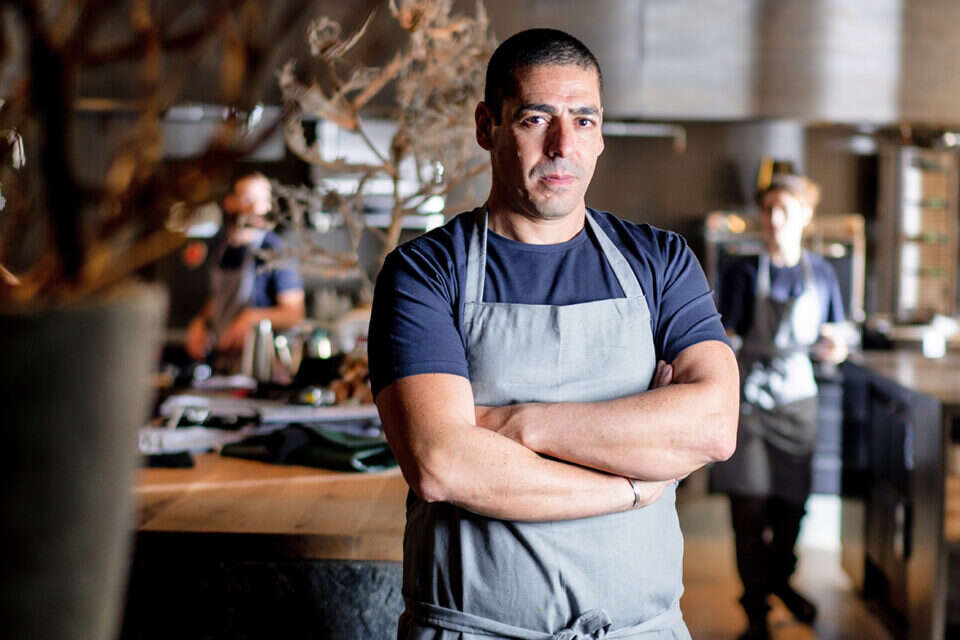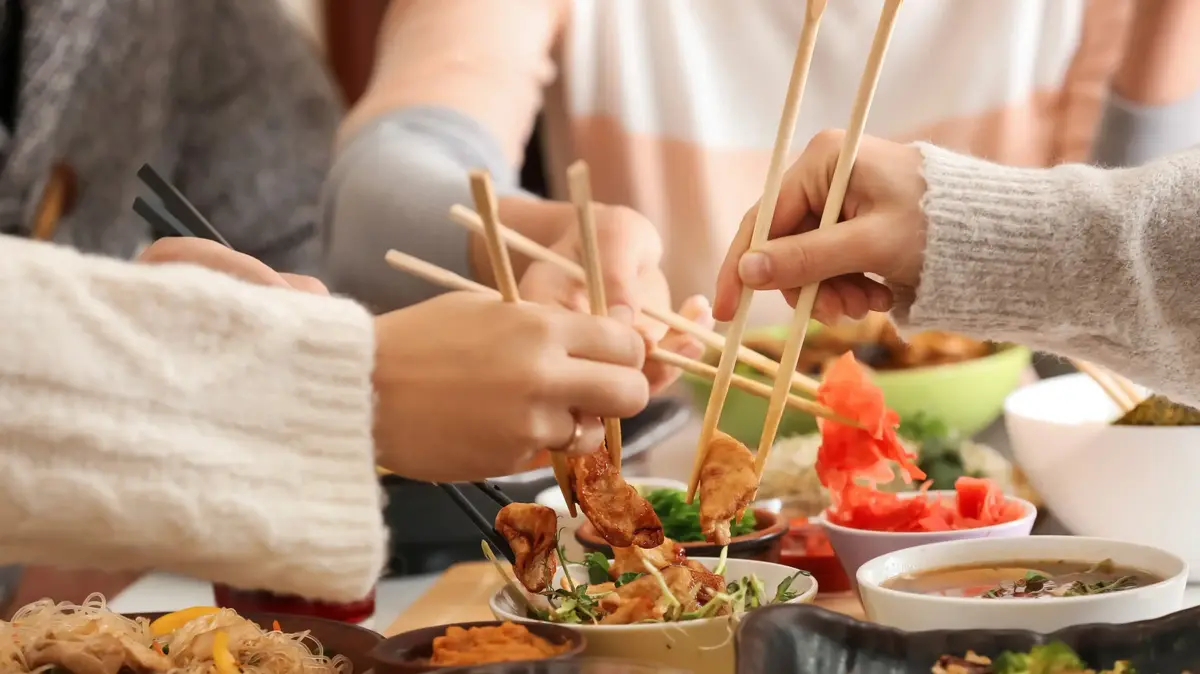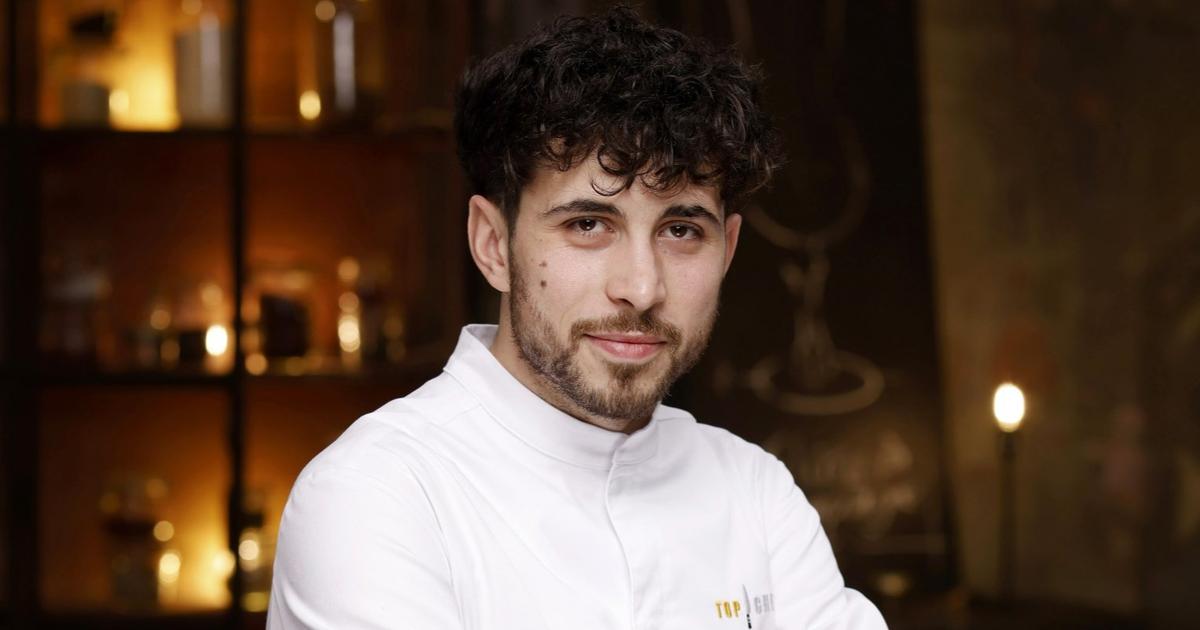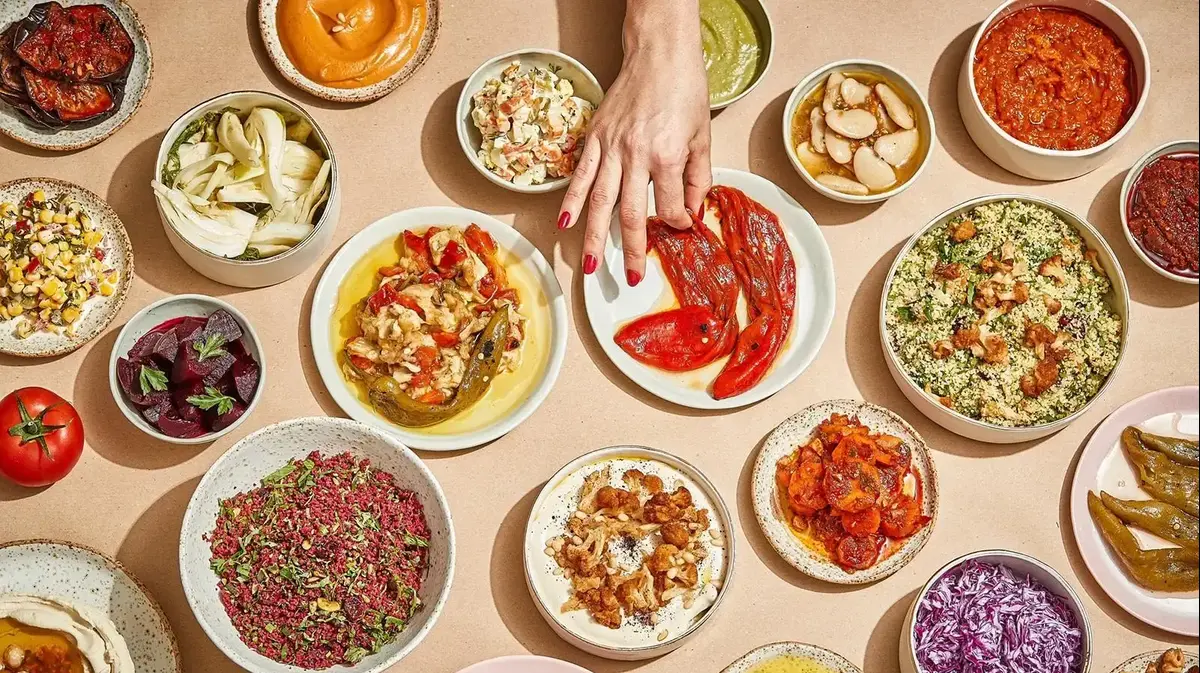The "Midtown" area of Tel Aviv in the early afternoon is a place full of construction noise, bus horns and people shouting into smartphones.
At the end, next to one of the large cafes in the complex, Chef Yossi Sheetrit's new restaurant door is locked.
"Out of curiosity we had to lock up," explains his wife, Naama, as she leads me to the back entrance.
"People passed by and saw Yossi, so they immediately went in to ask what was going on here. Although he is patient and nice to everyone, in the end we had no choice."
Hiba Restaurant (a Moroccan word that describes a kind of aura, inner strength and beauty, usually in relation to pregnant women), which is opening to the general public these days and is already open for reservations, is not just "Yossi Sheetrit's new" or a brave step during the Corona crisis - but the place To which the entire career and path the chef has gone since entering the kitchen, at his parents 'and grandparents' house in Ma'alot, drains.
"I am fulfilling the project I wanted to do all my life," Sheetrit is excited.
"This is the restaurant I have always wished for myself. Everything here is precise and reasoned, and I am involved in every detail, as I dreamed. It is the culmination of a journey that began when I was 16 and took shape as I experienced more things, until I formed my believing self.
"'Hiba' is what I saw in my imagination, at the level of the drawings. Curious passers-by who come in to look, vendors and also friends, say sentences like 'it looks like someone's house, not a restaurant', and that's the biggest compliment I can get."
Someone's house?
"Unambiguous. Both in appearance and character. This is a restaurant where everyone does everything. The cooks cook next to the diners, there is no separation of kitchen and seating space, as in other places, and there is no bar here at all. The waiter will take an order from you and go make the coffee himself "Open the door if you ring and no one else is available to open."
It may not interfere with functioning? Isn't it better for everyone to do what they excel at?
"The goal is to give a sense of home not only visually, but also at the level of feeling. That the diner will come and understand that everyone here does everything from everything, with huge love and great fun."
And where are you in all this? Chef or host?
"I too will be everything from everything, but to fulfill myself to the maximum I will be as much as possible in the kitchen. This restaurant is my home."
Will the dishes in the restaurant also be "homemade food"?
"We are in the State of Israel and the Middle East, so I will cook with as many local ingredients as possible, cheeses, spices, vegetables and fruits, meat. The concept of the restaurant is without a menu and I compare it to an artist's show. When I go to Aviv Geffen's show, for example, I do not "Tell him, 'Play me this song,' but dedicate and trust him with your eyes closed to take me on a journey. That's what's going to happen here as well.
Where does your inspiration for the food you cook come from?
"Where not? I always find inspiration from places I never thought. For example, when I walk in the fields or pick vegetables and fruits. Inspiration can come at any moment and from anything, and I am constantly learning."
• • •
In the summaries of the past year, and also in the one that preceded it, many chefs, restaurateurs and key people in the field talked about the shock that the Israeli culinary world went through during the Corona period, and the changes that took place in it.
It's not just about closing restaurants, as opening a restaurant was considered a gamble even before the virus, but also quite a bit of bureaucracy and difficulties that made the business, which was complex in the first place, much more complicated, even before we started talking about unprecedented price increases.
Beyond that, no less than five million shekels were invested in the new restaurant, and part of the amount was also "wasted" due to the delays brought by the Corona.
Sheetrit, who writes for the food section of this supplement, did open restaurants in the past, such as Kitchen Market and Mashiyah, but always under groups of investors who put in the big money.
In Hiba, on the other hand, he is almost everything, including a large investment of his money, which puts his name and prestige at much greater risk, as well as the financial situation of his family.
He and Naama, 42, who grew up in the village of Vradim near Maalot, met in high school and have been together for nearly 25 years.
They have two children, 12-year-old Ofir and 8-year-old Tomer, and they are also co-owners of a company they founded together, so "Hiba" is entirely a family project.
"Undoubtedly, there is huge comfort when you are with a group of investors," Sheetrit admits.
"But there are also quite a few compromises in this, because you do not rule exclusively. Hiba also has partners, but everyone is here because of me, and the restaurant is in my image."
We are at the peak of the omicron wave, with tens of thousands contracting daily. Many argue that opening a restaurant during such an unstable period is no less than an economic suicide. In "Hiba" you also invested your own money, are you not afraid?
"This journey brings a lot of fears and lack of sleep, no doubt. Opening a restaurant is a dangerous and worrying story, but it's my profession and it's what I like to do in life. Now I'm going to do it completely differently from anything I've done.
"I never opened a restaurant with the investment I invested in 'Hiba', both financially and down to the last detail. It was a long project that took a lot of time. We went almost two years from planning to execution, and there were many places along the way I could compromise and say okay. I did not compromise.I stayed with my believing self.
"The forced stop because of the corona caught us at the beginning of the planning stage. We did not know what a corona was and at the time there was talk of a recession and economic crisis, and no one had any idea what was going on and where it was going. And pay the architect if the economy is on the verge of collapsing? What, are we crazy?
"So we delayed the opening for quite some time and everything was in 'Hold' until we more or less understood, together with the rest of the world, what Corona is. Without a restaurant. "
On the other hand, the well-known phrase "any impediment to good" also applies to Sheetrit and his associates.
"Each delay gave us more time to be precise, especially at the planning stage," he says.
“We didn’t have a tight deadline that would have led to compromises, and that allowed us to get into pretty crazy subtleties.
"Professionals who were here said that at the planning and intelligence level of understanding the process, they had not seen anything like it in the country yet. We had time to pinpoint everything perfectly. It reached the level before construction I 'painted' the whole restaurant with spray, to understand what the place would actually look like.
"The goal is to give a sense of home."
Hiba Restaurant, Photo: Arik Sultan
Sheetrit is proud that there is nothing in the restaurant that has not passed under his strict eyes.
During the Corona period, as part of a project of the Hod Hasharon municipality with bereaved families, including Naama's family, he was exposed to the work of a local carpenter and "fell in love" with it.
The same carpenter produced some of the serving utensils in the restaurant, some of them together with Sheetrit himself, during calmer periods when he was free.
In the restaurant itself, by the way, you will find quite a few more tools and elements carved and created by the chef, together with his family.
"In recent months," says Naama, "our house in Hod Hasharon and the family jeep have become a real carpentry shop. The new family hobby is collecting planks, plants and branches on trips, each of which has the potential to become part of the restaurant's design."
The chef and husband hear and smile.
"Conceptually, there was no such place in the country," he declares.
"I feel like it's something they've not done here yet. I have hope and faith that one day people from Michelin will come to the country, and this restaurant is suitable to host them. It's here to do something sensational. I want to leave a mark, do something else, one that I can tell my children 'Be "Proud, your father was the first to do that."
The corona is a time for sensations?
"There are only 40 seats in the restaurant, and it will only work in the evenings and not every day. When I decided on that and told relatives and partners, they raised an eyebrow and asked 'do not you want to make money?'. It is understandable, If the price is not to make a lot of money - I will live with it. Right now I want to stay with my head above water and fulfill the dream.
"In the end, it's a matter of passion. At the momentum I was in I was able to open a huge restaurant with 200 seats that was full to capacity. I decided to go in a completely different direction because I want low supply and high demand. Even such an economic model can work and hold quite a bit of time." .
Still, why now?
"As much as it seemed a spontaneous step, everything was planned years back. I wanted to get to TV, for example, because I realized it was also a symbol of status and prestige. Whenever I was asked what I dream of doing in my career, the answer was a place like 'Hiba.' "It's on the screens of the people of Israel, and it has brought me a lot of customers. Once people like what you do, you can be more specific about the things you choose."
• • •
The story of "Hiba" began in October 2019, when Sheetrit announced the departure of the restaurants "Mashiyah" and "Kitchen Market", where he served as head chef.
A few months later, right at the same time as the corona entered our lives and the first closure, the contract was signed to rent the place where the restaurant is located.
"Originally, the plan was to fly for a month's family vacation in Thailand, before entering the intensive work. But then came the closure, and I think it also had great charm and I thank God for what happened to me there," he recalls, "a lot of people who came from an intense lifestyle say." I knew my family anew, but it's really true, not a cliché. "It did me good on a personal level."
The corona has also accelerated a process that is hurting both restaurateurs and customers - rising prices in the market.
A meal at Hiba will cost about NIS 450 per diner, although it will include about 15 dishes, in various sizes.
"True, eating with us will not be cheap," admits Sheetrit, "but behind every dish on the plate there is a whole set of expenses, so the weighting at the end is very expensive. You try to get out of it safely without rolling everything out to the customer, but also realize you can not get out of it Cheap, literally.
"The workforce has become very expensive, the prices of raw materials have gone up insanely, and it's sad and sucks. I wish I could offer a more friendly price to everyone, but I also experience the rise in prices, for example in the supermarket, restaurant rent and every expense. "Take care of it. We, the restaurateurs, want to get through the month. It's a change that needs to come from above."
Throughout the Corona crisis, there have been allegations against governments about abandoning the restaurant industry.
"Restaurants are an industry that the government needs to look at a lot more, also because we are a magnet for tourism. There are a lot of countries that through restaurants and culinary have caused a tourist air train. I hope one day they will open their eyes here and give everything to restaurants to promote them. The state, this is Zionism for everything.
Culinarily, quite a few good things happened here in Corona as well. We did not close and fold the tail until it was over, but made adjustments. Great chefs gave up the ego and moved on to take a takeaway, which shows a head enlargement and impressive survival ability. "Should we survive another round of this thing? I doubt it."
By the way, the concept of "without a menu" is common in the world, but is considered quite new in Israel. How will you make him successful with you?
"Israeli cuisine is still young in relation to many places in the world, and in its development we learn the business and behavioral structure within the restaurant. Look at what happens in street food and market restaurants, for example. Things are popping up that were almost non-existent a decade ago. "
Do you also consider a scenario of failure?
"Obviously yes. There is no certainty about anything, but the opening of the restaurant is not accidental, it was built after years of research. I believe in myself and my success."
"I need the spearhead by my side." Sheetrit with the restaurant staff, Photo: Assaf Carla
• • •
Sheetrit, who will celebrate on March 45, is far from the many stigmas and stereotypes attached to Israeli chefs.
He doesn't even have tattoos.
He is of Moroccan descent on both sides, including the accompanying culinary characteristics, but the first restaurant he opened in 2007, "Violet" in Moshav Udim in the Sharon, was generally French-style.
"I grew up in a home of food, obviously, and my grandparents always talked about cooking and the market, but what attracted me most personally was the possibility of expressing myself in the kitchen, as a painter or artist who influences people. It's important for me to speak differently and express myself, I find it relaxing big".
When did you know that the kitchen is your place?
"I'm not sure I had one moment like that. I went into the kitchen, saw that it made me feel good about the soul - and I stayed. My mind spoke more than I spoke, it swept me away."
Why did you choose to "escape" from the Moroccan roots in the beginning?
"There's something amazing about what happened to me in culinary. My first restaurant was very French. It was the trend at the time, French or Italian. I even hid my last name, and when I was asked what my name was I would answer 'Chef Yossi'. That was true at the time. , Even though I was not ashamed of myself. Slowly I also returned to my roots. One day a colleague asked me 'why do not you cook Moroccan food? You are Moroccan'. The demand for authenticity has become almost the most important today, but in the past it was not at this level. "That I have the Moroccan cuisine full of inspiration, to return to it if necessary. It's great fun."
In previous interviews you said that your father does not come to your restaurants because they are not kosher. What time is it?
"Hiba" will not be kosher, but I have no shadow of a doubt that someday I will have a kosher restaurant. Everything is timely. As for my father, it sucks me completely that he can not come and eat, but on the other hand he sees me successful, and that makes him happy. He is proud of me. "
• • •
Last October, a long but successful season of the cooking reality show "Chef Games" ended on Network 13. Sheetrit joined the judging panel in 2018, replacing Meir Adoni, alongside chefs Assaf Granit, Moshik Roth and Erez Komrovsky, who became his close friends.
With all three, he testifies, he consulted at all stages of the establishment of Hiba.
"We are always told how many chefs are non-collegiate people and full of ego," says Sheetrit, "but in the case of our quartet, the situation is completely opposite. We are members on a daily level. Moshik and Assaf were already in 'Hiba', and Erez also fully advised me. "We know that the success of one also contributes to the other, so we help each other. We have no ego, and we do not step on each other."
Moshik Roth is experiencing a painful closure to his restaurant in Amsterdam.
"His restaurant, like my 'Hiba', did not look like it was built for profit or money, but for something very, very personal. When something so personal closes, it feels like shutting down a shelter for a living enterprise. No matter what they say or what I do next. "Moshik had difficult moments and we accompanied him. His return to Israel helped him feel better."
Do you want to do something abroad?
"Obviously yes, always winking, and there is a chance that one day I will do, but everything on its own."
When will we see a woman at the judges' table?
"It really is time for that, already four seasons ago. We want to, but unfortunately this industry is more of chefs than of sanity. Of course I would love to see more women, both in culinary in general and in my kitchen and restaurant."
You are considered "Mami" among the people sitting at the table. Even in reality are you like that?
"My daughter Ophir once said to me, 'Dad, I'm not ready to be your sous-chef at home. You're becoming someone else.' "Friends and everything, but in the kitchen I can not be like that. So in the program I may be the national mummy, but until I enter the kitchen."
You spent quite a bit of time with chef Rafi Cohen during his peak period. Now his name has been linked to drugs, debts and criminal cases. What do you think about what happened to him?
"I worked for him at Rafael's restaurant. People talk about him all the time, but at some point I decided to stop listening to rumors and stories. If what is being told is true, then I'm terribly sad. It hurts to see how someone who was in a place like his got into such a situation. And pity him personally and his part in the world of Israeli cuisine.
"Every chef is different, and everyone has a different character, for better or worse. I try and try to be me, to keep my chin. I'm not one who knows how to look around and say 'look what happened to him, I have to be careful about that.' About myself and not comparing myself to others. "
• • •
Next Monday (January 24), the new program "Israel's Next Restaurant" will air on Network 13, in which he participates alongside his friends from "Chef Games" Assaf Granit and Moshik Roth, and the culinary wife Ruthie Russo.
In each episode, contestants will come and offer a whole restaurant concept, including design and menu, and cook some of the dishes.
At the end of the episode, the conductor will open a pop-up restaurant, which will be open to the general public.
Is not it a bit fanciful format at a time like this?
"There has always been a risk of opening restaurants in Israel. Does this prevent people from continuing to open restaurants? No. Will people continue to open restaurants? Absolutely. The market demands it. For the opening process of 'Hiba' ".
As a young chef, would you go to a program like this?
"It seems to me not ... I look at contestants with admiration and say 'wow, where do they have the courage to do that.'
And from the judge's chair, what tip would you give to a young chef or entrepreneur who wants to open a restaurant?
"Ask yourself first of all what you like and want to do, and only then decide and go by your stomach. That's what brought me to where I am today. Along the way there were a lot of people, including myself sometimes, who said 'you're not worth it, it's dangerous, leave "In the end, I went after the gut feeling - and it worked."
• • •
The culinary world, also in Israel, has changed quite a bit thanks to what is happening on social media, where chefs are crowned as the next thing and places become hot in an instant because of frequent mentions in stories.
"Instagram is a different niche from the world of the kitchen," says Sheetrit, who himself has more than 90,000 followers.
He said, "There is the world of likes and there is the world of restaurants, and they are different. Chefs for me are people who have a restaurant and they are in the kitchen. Through Instagram. "
What is your next biggest dream?
"Michelin star, unequivocally. I think all the other dreams I have already fulfilled, and still fulfill. I have a wonderful family, children and home, and when I look at everything I stop to say thank you again and again."
Speaking of family, what is the home cooking hierarchy? Do you cook, or do not bring work home?
"In Corona I was free so I cooked, but mostly Naama cooks. These are very basic but accurate and delicious things. She learned to make dishes like Moroccan fish that even Moroccans do not feel is someone else's hand.
"We like simple food. Dying for chicken in the oven, schnitzel and mashed potatoes, pastas. My eldest, Ophir, is very tasteful, she has demands. Little Tomer settles for steak with nothing and gummy candies. Separately, of course. I myself am always on a kind of diet, so "I don't eat a lot of fast food. Once a week or two we order pizza."
Still, what is your culinary Guilty Pleasure?
"Mostly desserts. The question is just what the mood is and what the weather is - and then choose. Beyond that, we can order home one day cocktails and one day borax."
"Love simple food, schnitzel and mashed potatoes."
The Sheetrit family, Photo: Gil Levin
What do you do when you're not in the kitchen?
"Exercising in the gym, routinely four or five times a week early in the morning. When I'm busy the frequency goes down, like now in the opening period, but I'll get back to that soon."
If you were not a chef, what would you be?
"Probably dealing with some art. Working on 'Hiba' I rediscovered the world of carpentry, and it seems to me that this is what I will do in retirement. I also like to sculpt and paint, and also a heavy rock lover. In the past I was a drummer in a metal band."
What would you say to Yossi 20 years ago?
"What I say to all the people I really like: See what you like - and mark a goal."
And to Lucy for another 20 years?
"it was worth it".
Hiba's recipes
Fish and avocado tartare
Photo: Assaf Carla,
Materials:
2 avocados of the hay variety
100 g sea fish fillet cut into cubes
30 grams of onion cut into small cubes
30 grams chopped chives
For the pickled lemon vinaigrette:
35 grams of lemon juice
70 grams of pickled lemon, without seeds
110 grams of tomato juice
25 grams of olive oil
15 grams of honey
2 grams of salt
טוחנים את כל חומרי הוויניגרט בבלנדר, מעבירים במסננת, טועמים, ואם יש צורך מתקנים את תיבול המלח והלימון. חוצים את האבוקדו לחצי, מוציאים את הגלעין ובעזרת כף מפרידים את הקליפה. מניחים את האבוקדו על קרש חיתוך, חותכים לפרוסות דקות ובעזרת כף היד משטחים אותן מעט, לצורת מניפה. מערבבים את חומרי טרטר הדג עם הוויניגרט, מסדרים מעל האבוקדו ומגישים.
כדורי תפוח אדמה ושמנת חמוצה
צילום: אסף קרלה,
החומרים:
- 1 ק"ג תפוחי אדמה
- 10 גרם מלח
- שמן לטיגון עמוק
- 2 גביעי שמנת חמוצה
מעבירים את השמנת החמוצה למסננת צפופה או ליריעת בד למשך שעה, כדי להוציא את הנוזלים. בעזרת מנדולינה, מכינים סלילי תפוחי אדמה (אפשר גם לחתוך לשיערות דקות, בעובי 2 מ"מ). מכניסים את תפוחי האדמה למים קרים עם קרח, שוטפים ומסננים. מוסיפים לתפוחי האדמה מעט מלח, מערבבים, מגלגלים את הסלילים לצורת כדור ומטגנים בשמן עמוק במשך דקה וחצי. מוציאים, מקררים מעט, מטגנים שוב למשך דקה וחצי, מוציאים, ממליחים ומקררים. מעבירים את השמנת החמוצה לשק זילוף, מזריקים לתוך כדורי תפוח האדמה ומגישים.
בריסקט דלעת
צילום: אסף קרלה,
החומרים:
- חתיכת דלעת גדולה (בקשו מהירקן מלבן בגודל תבנית שיש לכם, כמו נתח בשר)
לגלייז:
- 50 גרם מיסו
- 50 גרם דבש
- 5 גרם פפריקה חריפה
- 5 גרם פפריקה מתוקה
- 2 גרם זרעי כוסברה טחונים
לנוזל הבישול:
- 250 גרם סויה
- 250 גרם דבש
- 10 גרם פפריקה
- 40 גרם מים
Mix the glaze ingredients well together, and place in a bowl with a brush.
Now, mix all the cooking liquid ingredients well together, place the pumpkin in a pan and pour the liquid over it until covered (it is recommended to soak the pumpkin overnight in the fridge, but not required).
Put the pumpkin in the oven at 180 degrees for about two hours, remove, spread over the glaze and serve.
liranohali@gmail.com
Were we wrong?
Fixed!
If you found an error in the article, we'll be happy for you to share it with us








/cloudfront-eu-central-1.images.arcpublishing.com/prisa/3HRR2JWD2RHM3LA7C5552NJYKM.jpg)
